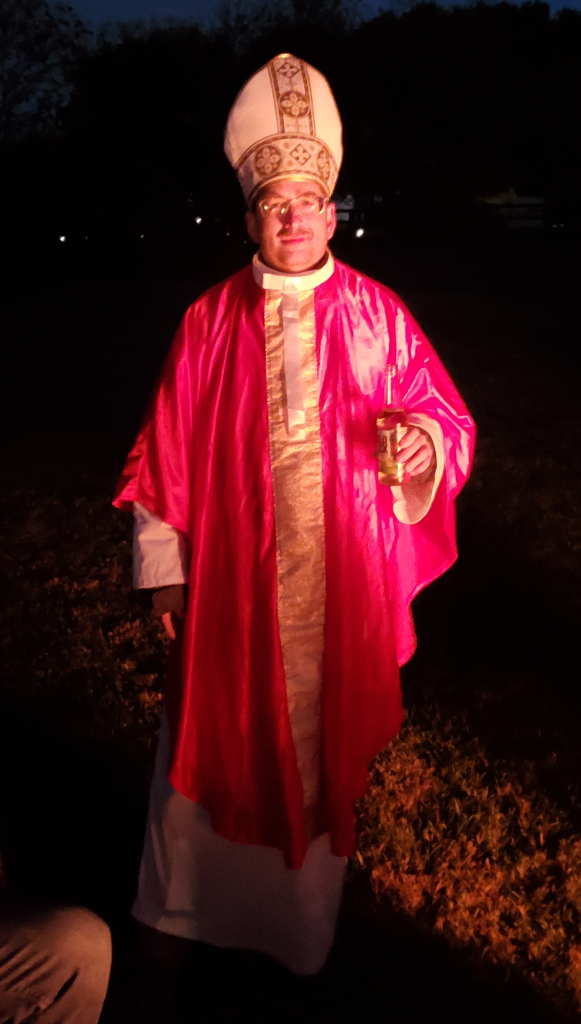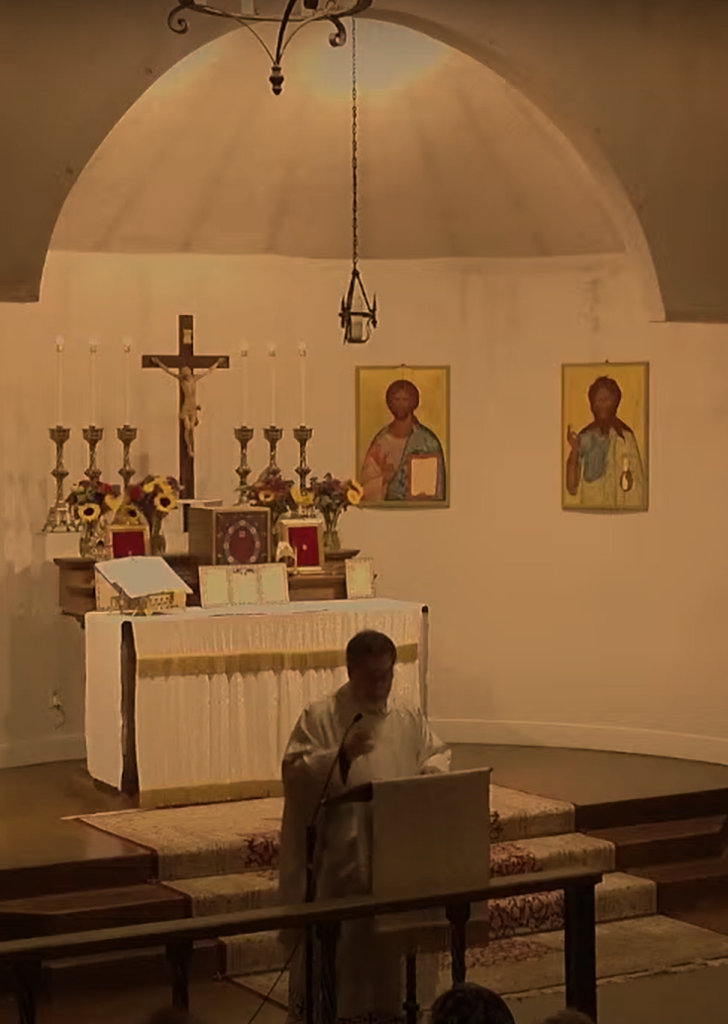Our church has just finished celebrating Hallowtide. We prepared for it with our All Saints bonfire night on Saturday the 26th, when we had fun dressing up as different saints. Here I am playing St. Gregory the Great.

On Friday the 1st, we had the All Saints Day Mass, followed by a requiem mass for All Souls on Saturday the 2nd. This coming week we have Mass almost every day to celebrate the feast of All Saints.
There is much confusion about Halloween and All Saints Day, including spurious notions about pagan origins. Understood rightly, however, the triduum of All Hallows’ Eve, All Saints’ Day, and All Souls’ Day is a time to celebrate the triumph of Christianity over the dark powers, and specifically to remember the power of Christian love overcame the brutality of the ancient world. Fr. Patrick Cardine mentioned this in his homily at the All Saints Day Mass, in addition to giving a brief history of this ancient liturgical season.
Fr. Patrick expanded on these thoughts in an interview he did with Kyle King for Barrell Age Faith. His interview is simply excellent, and helped fill in my knowledge about this important season in the Western liturgical calendar.
In this interview, Fr. Patrick navigated between the Scylla of politicized Christianity and the Charybdis of the anti-Christendom movement, showing how the message of Hallowtide offers a completely counter-cultural model of Christian engagement rooted in love and self-sacrifice.
One of the things I found particularly helpful was Fr. Patrick’s explanation about the Christian triumphalism of the Benedictines. If you want to jump to that part, it occurs at 1:00:52 in the conversation. He describes how the Benedictines helped build Christian culture and create the mighty civilization of Christendom (which is a good thing, by the way), by building and rebuilding over and over and over and over again. Each time the Danes destroyed their monasteries, schools and churches, they simply picked up the stones and started rebuilding.
The Benedictine example needs to be taken more seriously in our cultural moment when we are faced with the troubling trend whereby the “Benedict Option” (which is really just the church being the church, and then transforming culture as a byproduct) is being sidestepped by a more pessimistic slash-and-burn rhetoric which eschews the idea of cultural renewal and rejects Christendom as a viable concept. Having believed for so long that the only way to transform society is through politics, culture warriors are now responding to the current political malaise by shifting their goals from transforming western culture to destroying it. For example, notice how much of President Trump’s evangelical base see him as a Messianic figure not for building back up Christian civilization but tearing things down through a type of cathartic chaos. This slash and burn narrative exists in a strange type of symbiosis with the movement represented by Paul Kingsnorth, whose message “The West Must Die,” seems to problematize the very idea of cultural renewal and Christian civilization. That message, now platformed by First Things, can find apparent support in the hypotheses of Dr. Iain McGilchrist, whose theory of historical cycles would have us believe that western civilization is a ticking time bomb (which, in some people’s minds, means that trying to repair Western Civilization is like polishing the brass on a sinking ship).

The Benedictine example of rebuilding again and again gives a hopeful alternative, but it’s not what people want to hear right now. It offers Christian triumphalism without Christian nationalism, an optimistic eschatology without the materialism of postmillennialism, a hope for our civilization without predictions of short-term victory. Ultimately, it offers a strategy for cultural renewal that can work even in the face of—and sometimes precisely because of—martyrdom and apparent defeat. What does that look like in practice? It looks like Christians expanding the church in the midst of terrible persecution and plague. It looks like the Benedictine monks rebuilding their schools and churches after hundreds of defeats. It looks like King Alfred the Great gathering scholars to translate texts even when those around him were focused merely on survival. It looks like Dietrich Bonhoeffer getting engaged to start a family even in the darkest hour of the Third Reich. It looks like all the faithful artists, teachers, architects, philosophers, and poets of our tradition laboring to create Christian civilization against obstacles that were every bit as severe, if not worse, as those facing us today.
And that brings us back to Hallowtide. By celebrating this ancient feast, we join our voices with the early Christians to say, “Long live the glories of Christendom!,” and “God bless Western Civilization!” Tear it down and we will pick up the stones to rebuild, again and again. As Fr. Patrick said to Kyle King at 1:03:39, “Could we conquer the empire again? The answer is a resounding yes. We must. We don’t have a choice.”
But even this or that particular Christian civilization—whether the Christianized Roman Empire, Western Christendom, the Byzantine Empire, or Christendom in all its rich multiplicity of expressions—is not an end in itself. The feast of All Saints underscores that our goal is nothing less than the advancement of the kingdom of God on earth. Christendom is important, but only because it is situated in the much larger story of God’s inaugurated kingdom. And that is precisely why we can remain hopeful even in the face of apparent setback and defeat. As Peter Leithart reminded us in Touchstone,
Our sights are too narrow. We get focused on the collapse of our immediate world and lose sight of the fundamental meaning of history. The big story of the world isn’t the story of America, or of Western civilization. Those are big stories, but not the biggest. The big story is about the kingdom and city of God, about Jesus, King of kings, and his body, the church. Whatever is happening at the moment in the United States or the world is part of the unfolding fulfillment of the promise to Abraham to bless all the families of the earth.
Further Reading
- N.T. Wright on God’s Kingdom on Earth
- N.T. Wright on Living in the “now” but “not yet”
- The Power of the Pause: Gregorian Chant, Leisure, and the Joy of Going Slow
- When Worlds Die Encouragement for Christians Preparing for the End, by Peter Leithart
- Is God’s Kingdom Political?


